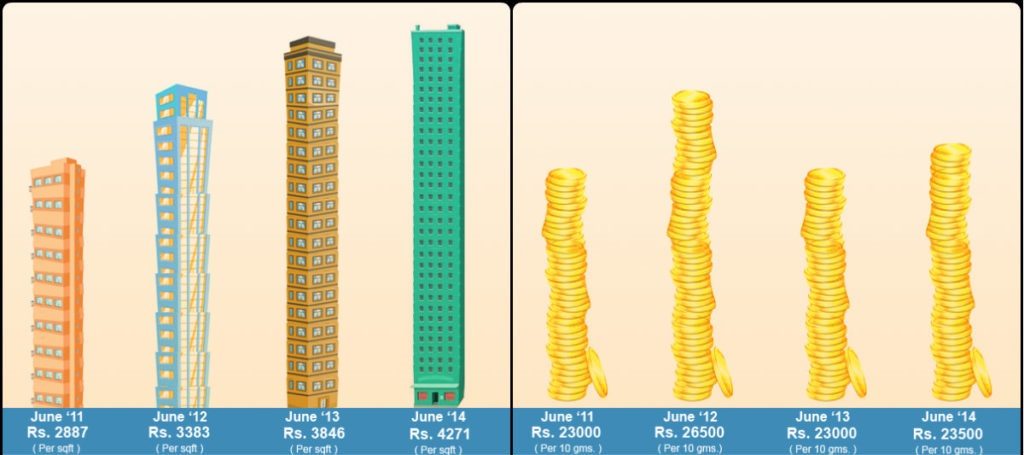Is NRI investment in Indian Real Estate a good deal?
Before you make a commitment to buying property in India, you might want to make sure that you’re making the right investment decision. There are three main avenues of investment individuals are faced with: real estate, stocks and gold. To help you decide which option will give you the maximum returns on your investment, here’s a comprehensive comparison between all three.
Real Estate Vs. Gold – Why Real Estate Wins
In India, traditionally gold and real estate have been two primary investment options for best returns. However, choosing between the two has always been a fairly difficult choice for most investors.

Here are few reasons why real estate proves to be a much better investment option than gold in the long run:
Steady Income:
Rental income still remains one of the best ways to generate passive income. Investment in commercial or residential real estate helps achieve this goal. While gold can be “worn”, it does not bring in a steady income, compared to real estate which nearly guarantees cash flow through rental returns.
Tax Benefits:
Home loans taken to purchase real estate become eligible for tax deductions on their interest and principal repayments upto a certain limit. This further increases the long-term gain on the property investment. An investment in gold, on the other hand, does not come with any tax benefits.
Leverage:
A home worth Rs. 70 Lakhs can be bought with a down payment of just Rs. 14 Lakhs (this could be as low as Rs. 7 Lakhs for buyers with an exceptionally high CIBIL score), while the balance amount can be obtained fairly easily as a home loan from banks and financial institutions. Home loans are also the cheapest loans available in the market and reduce the debt burden considerably as compared to other loan types. Purchase of gold, on the other hand, entails a 100% upfront payment and neither banks nor financial institutions provide financing to allow wealth creation through gold purchases.
To sum up the comparison of gold vs. real estate, gold would definitely make a good purchase as a fashion accessory or from the perspective of adding some diversity to one’s investment portfolio. But when you’re looking for larger returns, property investment would be a much better option for the informed NRI investor for real estate.
Real Estate Vs. Stock – Where to Invest?
The stock market and real estate are marked by distinct differences which set them apart. Here’s a comparison of the two investment vehicles considering all the factors in their favour and against.

Areas where Real Estate scores:
Cash Flow:
One of the biggest advantages of Real Estate is the constant cash flow it provides on a monthly basis. When renting a house, you can expect a constant cash income over a long period of time. Stocks, however, do not assure income on a constant basis, but for some periodical returns by way of dividends, rights issues and bonus shares.
Market Growth:
Over the past few years, Real Estate has seen a steady growth providing returns of about 20% especially after the price re-ratings that occurred between 2003 and 2008. The stock market is highly prone to fluctuations. Unless you are very adept at identifying high-quality stocks, there is no pre-existing pattern that can help you find out if a particular stock will give you good returns or not.
Market Fraudulence:
The chances of being deceived in real estate are less provided you have done your homework because you can physically inspect your property, run a background check etc. In stocks, the risks of being cheated are higher if you do not have enough knowledge about how the market works.
Areas where stocks score:
Initial Investment:
Initial investment in Real Estate is in most cases a minimum 20% of the value of the property. When buying a 2-BHK flat worth 40-50 lakhs, a minimum margin money of around 8 lakhs is still needed. The initial investment required in stocks is very low, sometimes even a few thousands.
Investment Options:
Real Estate investment is restricted to only two broad categories i.e. residential or commercial. Stocks, however, have a very diverse range of avenues to invest. With stocks, you can invest in a variety of industries and ensure that your investment is protected even if one industry does not perform well.
Liquidity:
In real estate, converting your property to liquid cash is a difficult procedure as it is time-consuming and dependent on how quickly you find a customer to purchase your property. Most stocks, on the other hand, are very liquid, with the money being credited to your account within three working days.
In general, when it comes to making a stable investment, real estate does seem the more obvious choice. An NRI buying property in India is largely protected from the fluctuations commonly seen in the stock market. So if you’re wondering if stocks or real estate is the best investment, you shouldn’t think twice about real estate.




























